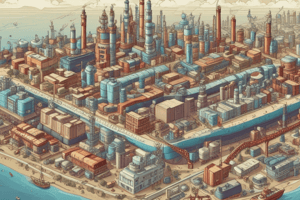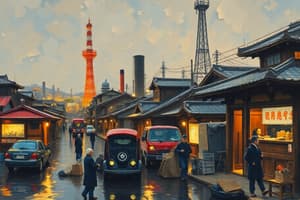Podcast
Questions and Answers
Which sector of industry extracts and uses natural resources to produce raw materials?
Which sector of industry extracts and uses natural resources to produce raw materials?
- Tertiary Sector
- Primary Sector (correct)
- Secondary Sector
- Mixed Economy
The tertiary sector of industry provides goods to consumers.
The tertiary sector of industry provides goods to consumers.
False (B)
What is the total value of goods and services produced by the economy in a period of time?
What is the total value of goods and services produced by the economy in a period of time?
GDP (Gross Domestic Product)
De-industrialisation occurs when there is a decline in the importance of the ______________ sector of industry in a country.
De-industrialisation occurs when there is a decline in the importance of the ______________ sector of industry in a country.
Match the following sectors of industry with their descriptions:
Match the following sectors of industry with their descriptions:
What is the main goal of most businesses in the private sector?
What is the main goal of most businesses in the private sector?
The public sector is owned and controlled by private businesses.
The public sector is owned and controlled by private businesses.
What is the term for the decline in the importance of the secondary, manufacturing sector of industry in a country?
What is the term for the decline in the importance of the secondary, manufacturing sector of industry in a country?
Flashcards are hidden until you start studying
Study Notes
Industry Sectors
- The Primary Sector extracts and uses natural resources to produce raw materials for other businesses, e.g., agriculture, mining, and foresting.
- The Secondary Sector manufactures goods using raw materials from the Primary Sector, e.g., automobile factory, textile industry.
- The Tertiary Sector provides services to consumers and other industry sectors, e.g., transportation, hotel, retail, and banking.
Comparing Industry Sectors
- The three sectors can be compared by percentage of workers employed in each sector.
- Alternatively, they can be compared by the value of output of goods and services as a proportion of total national output.
GDP (Gross Domestic Product)
- GDP is the total value of goods and services produced by an economy in a specific time period.
De-Industrialisation
- De-Industrialisation occurs when there is a decline in the importance of the Secondary Sector (manufacturing) in a country.
- Reasons for de-Industrialisation include:
- Depletion of primary resources, such as timber, oil, and gas.
- Loss of competitiveness in manufacturing to newly industrialized countries, such as Brazil, India, and China.
- Shift in consumer spending towards services as a country's total wealth increases and living standards rise.
Mixed Economy
- A Mixed Economy combines private and public sector businesses.
- Private Sector businesses are not owned by the government and aim to make a profit.
- Public Sector businesses are owned and controlled by the government, with a focus on the country's well-being rather than profit.
Privatisation
- Privatisation involves selling public sector businesses to private sector businesses.
- Reasons for Privatisation include:
- Private sector businesses aim to make a profit, which leads to cost control.
- Private sector owners might invest more capital in the business than the government can afford.
- Competition between private sector businesses can improve product quality.
Studying That Suits You
Use AI to generate personalized quizzes and flashcards to suit your learning preferences.




